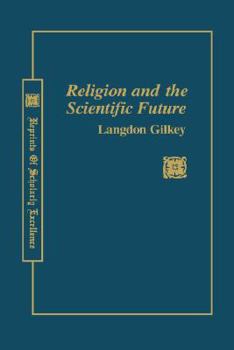Religion & Scientific Future
Select Format
Select Condition 
Book Overview
No Synopsis Available.
Format:Hardcover
Language:English
ISBN:0865540306
ISBN13:9780865540309
Release Date:January 1970
Publisher:Mercer University Press
Length:193 Pages
Weight:0.10 lbs.
Dimensions:0.6" x 9.0" x 6.0"
Related Subjects
Education & Reference Psychology Religion Religion & Spirituality Religious StudiesCustomer Reviews
1 rating
Myth and Morality in Modern Science
Published by Thriftbooks.com User , 15 years ago
Gilkey analyzes the language forms of science, current western theological models and the traditional theology of various faiths. He lays out the thought streams and modes of expression that indicate how modern science and religious thought have influenced each other. Mythical Gilkey shows that the language and theories of science in his day (1960s) are mythological, just a different kind of myth than the traditional western religious language. He likewise points out the problems with "demythologization" of Christian theological language. He further demonstrates how modern theology reflects the thought of the times, just as medieval philosophical theology of Europe reflected the Aristotelian thought of that time. Importance of Religion Gilkey proposes ways in which religious thought and language are indeed still important for modern society, and suggests how its language or message can become relevant again to the current society. His analysis emphasizes the amorality of the "science of power." As examples he refers to genetic engineering and other "applied sciences" to control man and the environment, which can become a tyranny of the scientific elite, who "know better." He thoughtfully shows how contemporary analyses of various ages indicate little difference in the human proclivity to evil and selfishness in the misuse of power for personal or group dominance and gain. Moral Voice The author proposes that the moral voice of Christian theology is necessary to remind scientists of the finitude of our knowledge. He deals with the contradictory claims within science, the myth of a static, orderly deterministic universe - universal unchanging laws of physics - and free will of humanity to manage their development by their own will and knowledge. He points out how arrogant and dangerous the gnosis of science is, the belief that knowledge will lead to virtue. Knowledge and Virtue Particularly helpful is his analysis showing the difference between the concept of knowledge and virtue between the ancient Greek philosophers and modern science. The Greeks held that the goal of knowledge (education) was wisdom, which would produce virtue. Modern science stresses knowledge for control or manipulation of the environment and planning of the future. Wisdom is the critical judgement to know how to use your knowledge well. Technology For Gilkey, lack of the critical judgement is indicated by the various problems created by technology, for instance, in the pollution of the environment or the side-effects of drugs.





